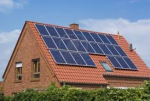
With energy costs rising rapidly the question of generating your own power is coming to the fore. By Fitting solar panels to your property you can produce most or all of the energy you need for your home but the initial investment is considerable. Could solar panels be the solution to your energy bills or will you have to accept that they are not the right investment for you?
Cost
A typical domestic system will cost around £7,000 to install but prices vary between installers. This is a huge outlay for many household to face but you could finance the installation via a loan to spread the costs. However you finance the deal do get comparative quotes before you proceed to ensure you are getting a good deal on the equipment.
Benefits
Your system could generate enough power for your home and so there is the potential to save back your entire current energy bills. In addition your system could be eligible for the Feed-in-Tariff scheme. Here you are paid for the electricity you generate even if you use it yourself and you can sell excess power back to the national grid. This process could save you an additional £700 per year but your tariff will be dependent on the energy efficiency of your home. Before installing a system ensure that it will qualify and acquaint yourself with the application process in advance. Please note that the scheme is applied to your system after installation and so you will not benefit from the income immediately.
The savings can be impressive but there are other advantages to consider too. Your carbon footprint will be reduced as solar energy is green, renewable and does not release any carbon dioxide or pollutants into the atmosphere.
If you have concerns over the weather you should know that solar panels can generate electricity even when it is cloudy but their performance is higher when the sun is shining.
Maintenance
Your panels will require surprisingly little maintenance. You need to keep them clean and free of debris which can be done with warm water. If you don’t fancy a trip to the roof there are companies which will clean the panels for you for a reasonable price. The panels should last around 25 years but you may need to replace the inverter (the device which converts direct current to alternating current) at some point and this will cost around £1000. This is another expense to consider when estimating your potential savings.
Moving House
The biggest potential issue for most householders is moving house. As few properties currently have solar panels it is difficult to assess the impact of solar panels on house prices but what evidence there is does suggest that you can realise a higher price for a home with panels fitted. Relocating your system could be a costly exercise and removal could impact on the look of your home. You may also find that you lose your Feed-in-Tariff agreement which is tied to the property rather than the equipment and you may not be able to benefit from the scheme when you reinstall your panels. As the scheme is offered for a duration of 20 years this is a major consideration. It is almost certainly best to leave the solar panels in situ but you should investigate your options before making a final decision. As things stand, if you think you may move in the near future, solar panels may not be for you.
If you are tired of high energy bills you should seriously consider solar panels as your next move. There is only so much you can do to reduce your bills. Once you have insulated your home, installed replacement windows, invested in energy saving equipment and turned your thermostat down you may still find that your costs are still rising and generating your own power could be the solution. Such a system is, however, a significant investment and could be a mistake if you are likely to move house in the next few years.
Sally Stacey is a keen writer whose energy bills are increased by working from home. She divides her time between writing and running her small business.
